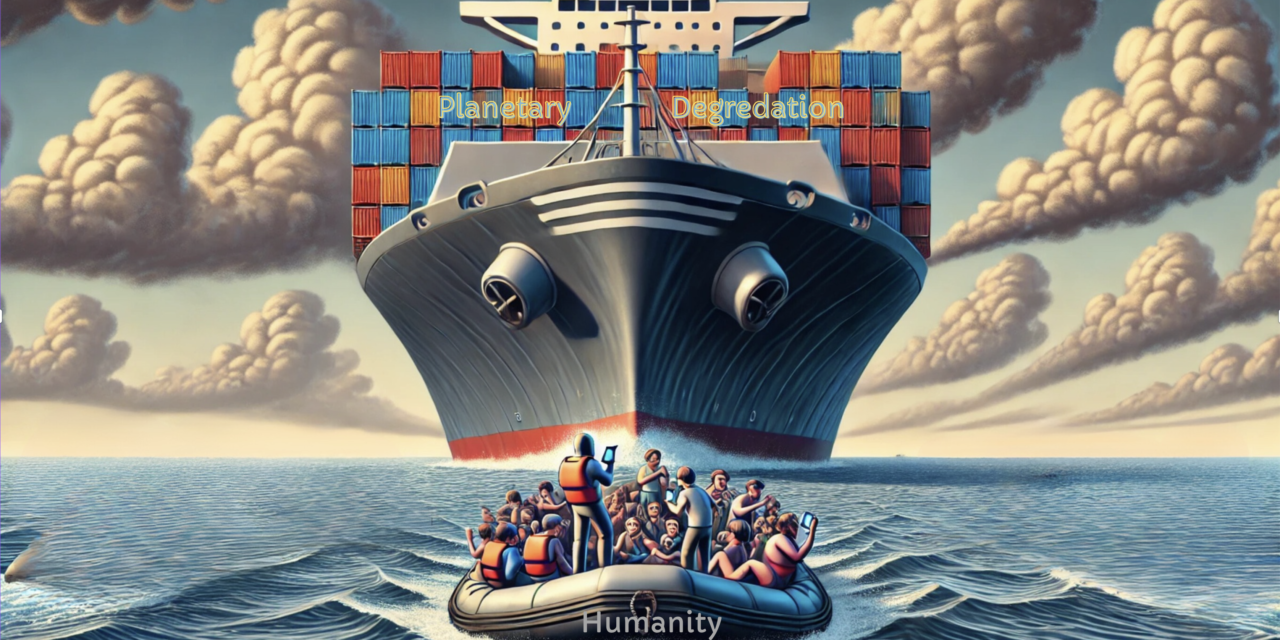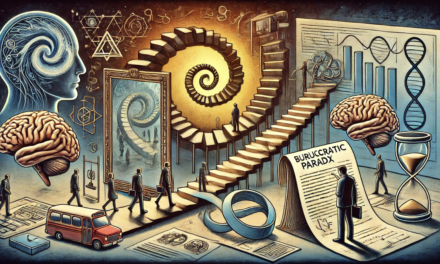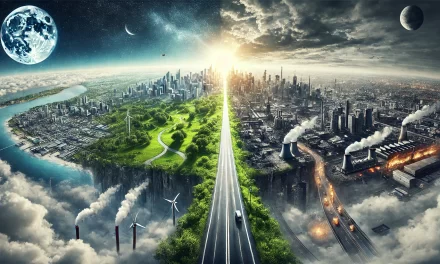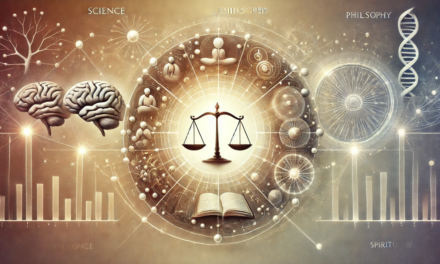In the blink of an eye—geologically speaking—humanity has transformed the Earth. Modern civilization, a mere 250 years old, has disrupted systems that took billions of years to evolve. The atmosphere, biodiversity, soil, and water systems—our planet’s life-support mechanisms—are being degraded at an unprecedented rate.
This post explores how we got here and what we might learn from three powerful perspectives: Geoffrey Vickers’ insights into regulation and operation, Sean B. Carroll’s Serengeti Rules, and Iain McGilchrist’s reflections on life and machines. Drawing from my research elevating project management to a second-order cybernetic system, I argue for a new story—one that aligns human systems with the principles that sustain life.
Regulation and Operation: The Key to Resilience
In his 1972 book, “Freedom in a Rocking Boat”, the late Sir Geoffrey Vickers, a pioneer of systems thinking, argued that successful systems must balance two interrelated processes: operation and regulation. ‘Operation’ involves executing tasks within established parameters—like a factory producing goods or a project delivering on its objectives. ‘Regulation’, on the other hand, is the adaptive process of monitoring and responding to changing conditions to ensure long-term stability.
When applied to human governance, this distinction reveals a stark imbalance. Humanity’s “operations” are running unchecked—deforestation, overfishing, carbon emissions—without sufficient regulatory feedback to adapt to planetary limits. Worse, the systems regulating the Earth, such as forests and oceans, are being eroded.
This imbalance mirrors challenges I encountered in my own field of project management. Viewing projects as isolated tasks (first-order systems) fails to capture their dynamic, interconnected nature. Elevating project management to a second-order cybernetic system required integrating feedback loops that adapt to complexity. In much the same way, humanity must integrate planetary feedback into its operations if we are to thrive.
The Serengeti Rules: Nature’s Blueprint for Balance
Biologist Sean B. Carroll, in The Serengeti Rules, shows how ecosystems regulate themselves through feedback loops and keystone species. In the Serengeti, lions and wildebeest maintain a balance that supports the entire ecosystem. When these feedback loops are disrupted—by human interference, for instance—ecosystems collapse.
Carroll’s work underscores the critical importance of feedback in maintaining balance. Like all living systems, ecosystems are resilient only when regulation is intact. Yet humanity’s economic systems operate as though feedback—such as climate change, biodiversity loss, and soil degradation—can be ignored or postponed.
Nature teaches us otherwise. The absence of regulation leads to collapse. The Serengeti Rules are not just ecological principles; they are lessons in governance, urging us to adopt feedback mechanisms that restore balance to the planetary system.
Life and Machines: A Question of Mindset
Iain McGilchrist’s reflections on life and machines provide a striking contrast. In his lecture, The Triumph of the Machine: Are There Reasons for Hope?, McGilchrist explores how life and machines differ fundamentally. Life is dynamic, adaptive, and self-regulating. Machines are static, predictable, and reliant on external control. Treating the Earth as a machine—where resources are inputs and economic growth is the sole output—misses the profound complexity of living systems.
This mechanistic mindset underpins much of modern industrial civilization, reducing nature to a collection of resources and human progress to GDP growth. However, as McGilchrist argues, life cannot be reduced to a set of discrete functions without losing its essence. To imagine a thriving future, we must replace this reductive worldview with one that respects life’s intrinsic complexity and adaptability.
Interdisciplinary Insights for a Resilient Future
Vickers, Carroll, and McGilchrist converge on a vital truth: resilience requires embracing the dynamic, interdependent nature of systems. Regulation, feedback, and adaptability are not optional; they are essential for survival.
These insights resonate deeply with my PhD research. Elevating project management to a second-order cybernetic system meant recognizing that projects do not exist in isolation. They interact with stakeholders, environments, and shifting conditions, requiring adaptive strategies to succeed. Similarly, humanity’s relationship with the Earth demands a second-order approach—one that integrates feedback loops, values adaptability, and sees humanity as part of a larger whole.
Reimagining Tomorrow
The narrative of In the Blink of an Eye offers a starting point. Humanity’s transformation of the Earth has been rapid and profound, but it need not be destructive. A new story must emerge—one that values thriving within planetary boundaries over endless growth.
This story would see humanity as a steward of the Earth, not its master. It would draw from the Serengeti Rules to restore balance, from Vickers to embed regulatory feedback, and from McGilchrist to replace mechanistic thinking with a respect for life’s complexity. Above all, it would inspire collective action across generations, recognizing that the problems we face today demand solutions that extend far beyond individual lifespans.
The challenge is immense, but so is the opportunity. In the blink of an eye, we’ve disrupted the planet. Now, we must use that same moment to reimagine tomorrow.
Appendix: A Simple Narrative – In the Blink of an Eye
Humanity’s existence is a mere blink of an eye in the vast timeline of Earth’s 4.5 billion years. Modern industrial civilization, which has radically reshaped the planet, spans just 250 years—a fraction of a fraction. Yet, in this brief moment, we’ve disrupted planetary systems that took billions of years to evolve: the atmosphere, biodiversity, soil, and water systems are being degraded at unprecedented rates. This rapid transformation, driven by economic and technological growth, has created an unsustainable way of life.
Our economic system assumes that nature’s resources—minerals, forests, clean water—are infinite and that the damage we inflict on the planet is free of charge. We celebrate GDP growth while ignoring the depletion of natural capital, treating ecological destruction as an external problem for future generations to solve. This illusion of progress has created wealth but at the cost of the Earth’s ability to sustain life.
The mismatch between the urgency of systemic change and the natural timescales of human thought and planetary recovery is stark. Humans live short lives, think in terms of decades, and prioritize immediate needs. But the problems we face—climate change, biodiversity loss, resource depletion—demand long-term solutions beyond individual lifespans. This requires a shift from short-term, individual thinking to long-term, cultural-scale action.
Cultural change happens slowly, but it has the power to embed long-term thinking into shared values, institutions, and systems. To address this crisis, we need a new story—one that values thriving within planetary boundaries over endless growth. It must reconnect humanity to its role as a steward of the Earth, not its master, and inspire collective action across generations.
The challenge is immense, but so is the opportunity. Humanity’s future depends on awakening to this moment and aligning our way of life with the systems that sustain us. In the blink of an eye, we’ve disrupted the planet. Now, we must use that same moment to reimagine tomorrow.
Terry Cooke-Davies
23rd November 2024
Profound thanks to ChatGPT(4o) from OpenAI for assistance with this article.







I completely agree with this analysis. The emphasis on regulation, balance and inter-relationship comes across strongly. This chimes with the argument put forward by Fritjof Capra and others that principles drawn from ecology rather than principles drawn from physics will prove most useful in the years to come. What we lack at the moment, as George Monbiot points out,, is a compelling sustainability story. Fairy tales often hinge around a hero who seeks or obtains untold riches. What is the new story which we need to tell?